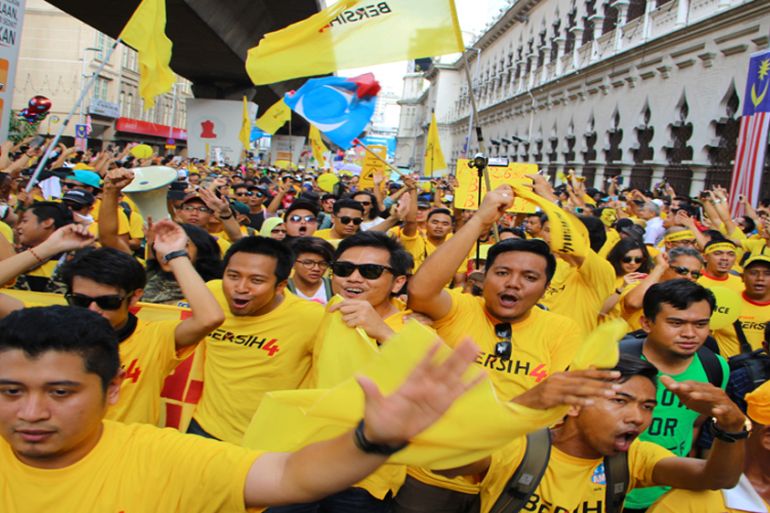Yellow protesters unafraid calling for PM’s resignation
Despite threat of military deployment, tens of thousands of Malaysians rally over alleged corruption and economic woes.

Kuala Lumpur, Malaysia – Ignoring orders not to demonstrate and defying a ban on yellow T-shirts, thousands of protesters slept overnight in Independence Square demanding the prime minister’s resignation.
|
|
| Malaysia: Protest call to clean up politics |
The mass protest – organised by a coalition of non-governmental organisations known as Bersih, or “Clean” – planned the two-day rally in the wake of damaging corruption allegations involving Prime Minister Najib Abdul Razak.
Keep reading
list of 4 itemsA year since Pakistan’s May 9 riots: A timeline of political upheaval
Fiji’s former Prime Minister Frank Bainimarama jailed for a year
Candidates confront corruption and inequality in Panama’s presidential race
Bersih’s demands include free and fair elections and a right to demonstrate, which had been denied with the refusal of a protest permit.
A previous Bersih rally in 2012 had been dispersed by police with tear gas and chemically laced water fired from vehicle-mounted cannons.
On Sunday, there was a strong police presence behind barricades surrounding Independence Square. However, police officials said no crackdown would occur as long as there was no attempt to breach the barriers.
As of Sunday afternoon, no major clashes with police had occurred.
Just after midnight, Ong – who only wanted to give one name – along with two friends stretched out thin paper bags they had brought along and rested their heads on the street curb.
When asked by Al Jazeera why he had decided to spend the night on the street Ong said, “To save my country, to have our voices heard.”
![Protesters stayed overnight to 'make their voices heard' [Jarni Blakkarly/Al Jazeera]](/wp-content/uploads/2015/08/5b508587f9a34d979979bbbc0f611241_18.jpeg)
The $700 million question
The two-day demonstration was called more than a month ago following a story published in the Wall Street Journal that said $700m had been transferred into Najib’s private bank account. The revelation was one in a long list of scandals surrounding the government, but the first to directly involve the prime minister.
Najib initially denied the allegations, but later admitted the money had been transferred into his account ahead of the 2013 election. The money was described as a donation from an unnamed Middle Eastern country.

The government played down the rally on Sunday with communications director Abdul Rahman Dahlan noting the Najib administration “is still standing”.
Abdul also told Al Jazeera an investigation into the $700m is under way, and the government is examining ways to tackle the rising cost of living and the plummeting Malaysian ringgit.
The timing of the Saturday-Sunday demonstration was symbolic with Malaysia’s Independence Day on Monday. Organisers said protesters would disperse after midnight.
Malaysia has not had a change of government since independence from Great Britain in 1957. This year’s Independence Day marks the country’s 58th year under the rule of Najib’s United Malays National Organisation (UMNO).
RELATED: Questions persist in Malaysia donation case
Authorities spent last week trying to dissuade protesters from holding a rally, which was declared “illegal”. There were also threats about the possible deployment of the military.
On the eve of the demonstration, the government blocked access to four websites related to the protests.
However, it was the decision to add yellow T-shirts with “Bersih” on them to the list of prohibited items under the Printing Press and Publications Act – effectively making them illegal – that irked the public the most. Yellow is the colour of the Bersih movement.
On Saturday, the rally was scheduled for 2pm but crowds started gathering in downtown Kuala Lumpur as early as 10am. It soon became clear the government’s fear tactics hadn’t worked.
![Protesters took to the streets despite government threats to voice their dissatisfaction [Jarni Blakkarly/Al Jazeera]](/wp-content/uploads/2015/08/4c4a34ed2f65441885eceabb07a7dc21_18.jpeg)
‘Right of dissent’
Activist Adam Adli, recently sentenced to a year in prison for political expression under the controversial Sedition Act, told Al Jazeera the mass turnout showed Malaysians refused to be intimidated.
“Tomorrow Najib may still be in power, but at least we have done something. We came out and voiced our dissatisfaction. We have defended our rights to dissent,” said Adli, whose case is under appeal.
Despite the prime minister’s denial of wrongdoing and promises to reform political campaign financing, Najib has remained under sustained pressure from the opposition and critics within his own party.
UMNO had its worst-ever showing at the last general election in 2013, losing the popular vote to the opposition coalition, but holding onto power because of gerrymandered seats.
To counter the growing discontent within the party, last month, in the space of 24 hours, Najib sacked the deputy prime minister, the attorney general, and four cabinet ministers who had voiced issues with his leadership.
RELATED: Malaysia anti-government protests continue
Energy grew as crowds began to swell in the scorching sun on Saturday. People packed narrow streets with speeches given by activists and opposition politicians amid enthusiastic chants of “Najib Resign” and “Power to the people”.
Police said 29,000 people gathered on Saturday, while rally organisers said 200,000 turned out. Independent news site Malaysiakini estimated the crowd at 100,000.
While many of the people there voiced their concerns about corruption, the falling ringgit, rising costs of living, and the government’s racial rhetoric were also raised.
Former P rime Minister Mahathir Mohamad showed up at the rally on Sunday and reiterated his call for Najib to step aside.
Wan Azizah Wan Ismail also attended the protest. She is the wife of jailed opposition leader Anwar Ibrahim, who was sentenced to three years in prison on sodomy charges in April. Anwar has maintained the allegations were politically motivated.
Bersih chairwoman Maria Chin Abdullah told the rally a motion of no-confidence in the prime minister should be presented when parliament reconvenes in October.
![Activists and opposition politicians gave speeches against corruption and limits on freedom of speech [Jarni Blakkarly/Al Jazeera]](/wp-content/uploads/2015/08/1c510abe8a7b447d93d87bf3133bcf3f_18.jpeg)
Racial divide?
|
|
| Malaysia: The $700 million scandal |
As night fell, a small number of Muslim protesters held a group prayer. One of the main criticisms of the Bersih movement has been its failure to attract equal levels of support across Malaysia’s ethnic and religious divide.
The vast majority of rally-goers were Chinese Malaysian or Indian Malaysian with Malays, the country’s largest ethnic group, largely under-represented.
Dzulkefly Ahmad, a Malay politician from the new opposition party Gerakan Harapan Baru, told Al Jazeera ethnicity is not a major factor in the demonstrations.
“I don’t think it’s fair to say the Bersih movement is Chinese dominated. It’s no longer about ethnicity now, the consciousness cuts across race and religious adherence. I think it’s very flawed and misplaced to conclude that the movement is dominated by anyone,” Dzulkefly said.
Organisers had asked people to come prepared with sleeping bags to stay on the street overnight.
“I don’t want to see any of you sleeping in a hotel. I want to see you sleeping here,” one organiser told the cheering crowd after the end of speeches at midnight.
Follow Jarni Blakkarly on Twitter: @JarniBlakkarly